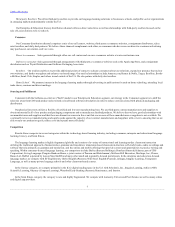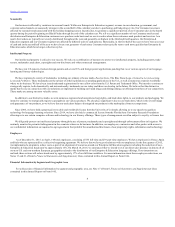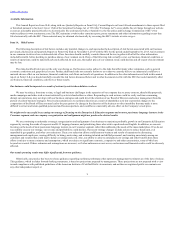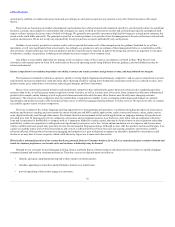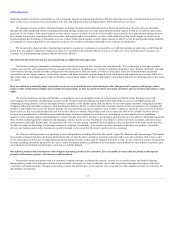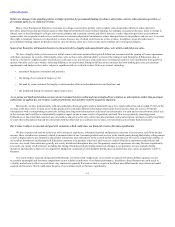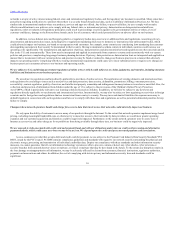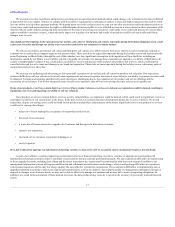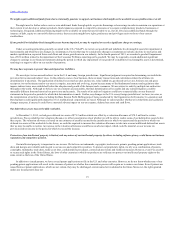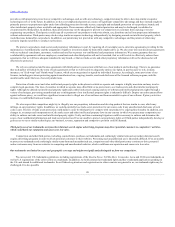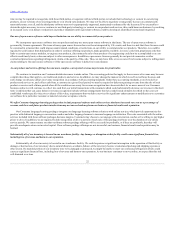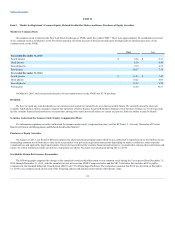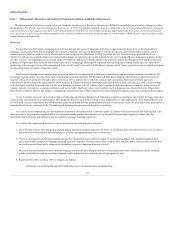Rosetta Stone 2015 Annual Report Download - page 18
Download and view the complete annual report
Please find page 18 of the 2015 Rosetta Stone annual report below. You can navigate through the pages in the report by either clicking on the pages listed below, or by using the keyword search tool below to find specific information within the annual report.
Table of Contents
We are subject to rules, regulations and practices governing our accepted payment methods which could change or be reinterpreted to make it difficult
or impossible for us to comply. A failure to comply with these rules or requirements could make us subject to fines and higher transaction fees and we could
lose our ability to accept these payment methods. We depend upon our credit card processors to carry out our sales transactions and remit the proceeds to us.
At any time, credit card processors have the right to withhold funds otherwise payable to us to establish or increase a reserve based on their assessment of the
inherent risks of credit card processing and their assessment of the risks of processing our customers’ credit cards. If our credit card processors exercise their
right to establish or increase a reserve, it may adversely impact our liquidity. Our business and results of operations could be adversely affected if these
changes were to occur.
Any significant interruptions in the operations of our website, call center or third-party call centers, especially during the holiday shopping season, could
cause us to lose sales and disrupt our ability to process orders and deliver our solutions in a timely manner.
We rely on our website, an in-house call center and third-party call centers, over which we have little or no control, to sell our solutions, respond to
customer service and technical support requests and process orders. These activities are especially important during the holiday season and in particular the
period beginning on Black Friday through the end of the calendar year. Any significant interruption in the operation of these facilities, including an
interruption caused by our failure to successfully expand or upgrade our systems or to manage these expansions or upgrades, or a failure of third-party call
centers to handle higher volumes of use, could reduce our ability to receive and process orders and provide products and services, which could result in
cancelled sales and loss of revenue and damage to our brand and reputation. These risks are more important during the holiday season, when many sales of
our products and services take place.
We structure our marketing and advertising to drive potential customers to our website and call centers to purchase our solutions. If we experience
technical difficulties with our website or if our call center operators do not convert inquiries into sales at expected rates, our ability to generate revenue could
be impaired. Training and retaining qualified call center operators is challenging due to the expansion of our product and service offerings and the
seasonality of our business. If we do not adequately train our call center operators, they will not convert inquiries into sales at an acceptable rate.
If any of our products or services contain defects or errors or if new product releases or services are delayed, our reputation could be harmed, resulting in
significant costs to us and impairing our ability to sell our solutions.
If our products or services contain defects, errors or security vulnerabilities, our reputation could be harmed, which could result in significant costs to us
and impair our ability to sell our products in the future. In the past, we have encountered product development delays due to errors or defects. We would
expect that, despite our testing, errors could be found in new products and product enhancements in the future. Significant errors in our products or services
could lead to, among other things:
• delays in or loss of marketplace acceptance of our products and services;
• diversion of our resources;
• a lower rate of license renewals or upgrades for Consumer and Enterprise & Education customers;
• injury to our reputation;
• increased service expenses or payment of damages; or
• costly litigation.
If we fail to effectively upgrade our information technology systems, we may not be able to accurately report our financial results or prevent fraud.
As part of our efforts to continue improving our internal control over financial reporting, we plan to continue to upgrade our existing financial
information technology systems in order to automate several controls that are currently performed manually. We may experience difficulties in transitioning
to these upgraded systems, including loss of data and decreases in productivity, as personnel become familiar with these new systems. In addition, our
management information systems will require modification and refinement as our business needs change, which could prolong difficulties we experience
with systems transitions, and we may not always employ the most effective systems for our purposes. If we experience difficulties in implementing new or
upgraded information systems or experience significant system failures, or if we are unable to successfully modify our management information systems or
respond to changes in our business needs, we may not be able to effectively manage our business and we may fail to meet our reporting obligations. In
addition, as a result of the automation of these manual processes, the data produced may cause us to question the accuracy of previously reported financial
results.
17


